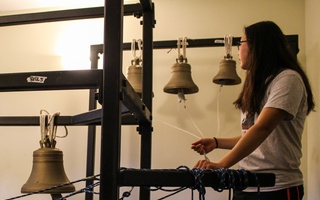A Harvard delegation visited a Russian bell foundry last Thursday, as University representatives and Russian officials prepare for the return of the Lowell House bells to Moscow’s Danilovsky Monastery.
The trip, if succesful, could mark the end of years of negotiations over the return of the Lowell bells—some of which date back to the 17th century—that have remained at Harvard for nearly 80 years.
Lowell House will receive newly molded bells from the Vera Bell Foundry in Voronezh, Russia, which was hand-picked from five foundries that University representatives surveyed last August.
The delegation—consisting of Associate Provost of Art and Culture Sean T. Buffington ’91, project manager Peter Riley, and Lowell House tutor Luis A. Campos—visited the foundry last week to inspect the casts for the replacement bells. The group also attended several ceremonies over the weekend and is expected to return March 21.
According to Buffington, the delegation hopes to sign an agreement before they depart, as details are currently being finalized. The University and monastery are expected to make the switch in the summer of 2008.
“I’m heartbroken not to be there,” said Lowell House Co-Master Diana L. Eck, who could not accompany the delegation because of her teaching duties as a professor of comparative religion and Indian studies.
Bell makers from the Vera Bell Foundry visited Lowell House in February and used a centuries-old process known as lost-wax casting in order to make rubber moldings of the bells, which they brought back to Russia and used to make the casts for the replacements.
The original bells came to Lowell in 1930, when American industrialist Charles R. Crane donated them to the University. He had purchased them in Russia, where Stalin was closing all of the churches and melting their bells for raw materials.
The Danilov Monastery, the bells’ original home, was spared destruction and served as an orphanage for children of dissidents. The monastery reopened in 1988 and began negotiations with the University in December 2003 for the return of the bells.
Talks stalled over the costs of sending the bells to Russia and the purchase of their replacements, which the University was unwilling to pay. Last September, however, a Russian metals mogul offered $1 million to transport the bells to Moscow and to finance their replacements.
According to the Danilov Monastery’s website, the return of the bells represents “the restoration of historical truth in relation to the Russian faithful.”
“As a scholar of religion, the religious aspects of this process are fascinating,” Eck said.
Read more in News
Sciences To Fuel Faculty GrowthRecommended Articles
-
Our House, Our BellsThe Russians are mad at Harvard again. But this time, instead of faculty bungling their economy, it’s an alum pilfering
-
Russian Monks To Visit, Seeking Return of Lowell BellsA delegation of monks from Moscow’s Danilov Monastery—including the spiritual leader of the Russian Orthodox Church—is due to arrive in
-
Lowell's Russian Bells Set to Head HomeAfter nearly 80 years in the Lowell House belltower, Harvard's historic Russian bells may be heading home to a centuries-old
-
Harvard Signs Official Pact With Monastery to Send Historic Lowell Bells Back to Russia by Summer 2008Lowell House’s historic Russian bells are officially headed back to the motherland, following a formal agreement inked in Moscow Tuesday
-
 Notes from the Underground Bells
Notes from the Underground Bells













